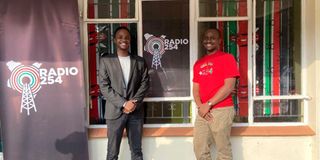Playing carefully curated Kenyan content is our goal

Eric Kinyua (CEO Radio254) and Njukia Kiuri (Founder Radio254).
What you need to know:
- Initially, he did not think Radio254 needed a physical space because everything could be done online – talking to artists, receiving music and even airing them.
- “But when I met Eric, we saw the possibility of building a space where artists could meet, collaborate, participate in interviews and even record music."
From as early as 2013, Njukia Kiuri wanted to own a radio station. His goal? To play as much Kenya music as possible.
“The process of acquiring a radio station frequency proved tough. I had to fill many forms and was thereafter put on a waiting list for years! This was demoralising. I reaslised that even if I got a frequency, I would still need to put up towers in different cities, which is very expensive,” says the 26-year-old.
These hurdles made it impossible for Njukia to realise his dream as soon as he would have loved to.
When Covid-19 struck, however, Njukia had a light bulb moment. He realised that more people were spending more time on the internet, and he saw new possibilities for his dream.
“I started to look at radio differently. While tough regulations made it difficult and expensive for me to set up a radio station, the internet space was free,” he says.
Njukia decided to set up an online radio station, effectively marking the birth of Radio254, a non-profit online station that strictly airs Kenyan music and content.
He later partnered with Eric Kinyua, who is now the CEO of the radio station, and together they acquired a physical space.
“Eric already had a studio where he used to record music, create corporate jingles and advertisements,” Njukia says.
Initially, he did not think Radio254 needed a physical space because everything could be done online – talking to artists, receiving music and even airing them.
“But when I met Eric, we saw the possibility of building a space where artists could meet, collaborate, participate in interviews and even record music. We thought that we could get competitive advantage by acquiring the space,” Eric says.
Between October 1, 2020 when the station was commissioned and today, Radio254 has garnered at least 750,000 listeners, and built a music library comprising at least 22,000 Kenya songs.
“Kenyan music is good but many people don’t know how to access it. Our goal is to encourage audiences to listen to great Kenyan music. While curating the content we receive, we have confirmed that there is really good content produced locally. Radio254 enables us to make Kenyan music more accessible,” Njukia says.
He notes that there is a misconception among Kenya’s urban youth that the only genre of music that exists in Kenya is Gengetone, yet Kenyan music is so much more diverse. His aim is to quash this misleading notion.
“Because the shows are available online, listeners can tune in from all over the world. If we would have acquired a frequency, the radio would be limited to Kenyan listeners so it is better we went with the option of online radio,” Njukia says.
Most budding artists take between seven and 10 years to get their content aired on radio, but Radio254 supports them by giving them a platform where their music can be heard and where they can interact with listeners through interviews.
“To play only Kenyan content is a big risk, but we are determined to play our role in building the industry and a culture of appreciating Kenyan music. From an interview with Radio254, an artist was booked to perform at two weddings, and another was called to perform in show outside Kenya after listeners interacted with and loved his content. This is satisfying for us because our goal is to give artists a platform to grow,” Njukia says.
To set up the station, the primary task was to build a website, come up with a trademark and hire a lawyer to handle the contracts they entered with the various artists and to ensure their brand remained protected.
Njukia, who graduated with a Master of Science in Information Technology from the University of Virginia, built the website and then worked with an artist to design the graphics.
“I was working at the time and I invested my salary in the business. Whenever I needed to hire someone, I paid them using my salary. I used my job to fund my passion,” he says.
Njukia and Eric now work with a team of seven.
“We all work together, we are all friends and are working towards a similar purpose,” Eric says.
Some of the key lessons Njukia has learnt over the last ten months of operation are that experience sometimes trumps academic knowledge, and that sticking to the rule book may not always work, so if you have an idea, start something and learn as you go.
As a non-profit start-up, Njukia admits that getting funding is a big challenge.
“We rely on donations to maintain our operations, and it is quite hard to do our work and still meet our operating costs. But, we are focused on our goal, not on making money,” he says.




